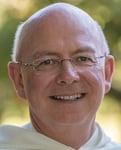Easter Vigil time and Friday meat-eating
Dear Father,
Some might call me a liberal Catholic because I really get into what I call fun stuff at liturgies. My favorite liturgy is the Easter Vigil. I love the fire, the candle, the Exultet, the RCIA people getting baptized and confirmed. But I have a problem. My pastor wants the Easter Vigil to start at 8 p.m. I thought it was supposed to be at night. I feel like he’s taking the fun out of a campfire at night.
-Brant
Dear Brant,
Categories such as liberal and conservative aside, I’m with you in your love for what you call “fun stuff” in our Catholic worship. Holy Week liturgies take the cake on that score. My personal favorite is Holy Thursday with its Eucharistic procession and the stripping of the sanctuary afterward.
The Easter Vigil uniquely begins with a large outdoor fire with all the parishioners gathered around it. Then the priest blesses the fire and lights the Easter Candle with that new blessed fire. The Easter Candle is processed into a dark church, that is, with all the lights turned off. The Deacon announces “The Light of Christ!” Then the darkened church gradually becomes alive with hundreds of handheld candles all lit from the one flame of the Easter Candle.
Year after year it continues to be an amazing experience as each of our candles collectively light up the church. And it all began with that one Flame that represents Christ. Then the Deacon sings praises to God for the fire and light and Christ, the Exultet. Who doesn’t love a bonfire and the play of light in the dark?
It’s a shame that you and your fellow parishioners won’t get to experience this. Believe it or not, the Church actually has rules about starting the Vigil well into the dark so that we can see and feel the fire, the one Flame, the lighting of our small candles, the joining of our singular light to the Body of Christ, the chanting in praise of the Flame of the Easter Candle.
It’s fascinating that the Church says that this greatest of all solemnities, the Easter Vigil, “must take place during the night, so that it begins after nightfall.” We are told that “this rule is to be taken according to its strictest sense.”
Nightfall is not synonymous with sunset, which, this year occurs around 7:55 p.m. on Holy Saturday (March 30). Nightfall is the time when the sky is darkened and we are able to see the stars and planets; we need the help of lights to see. This year, complete darkness occurs after 9 p.m. For this reason, priests have been instructed to set the time for the Easter Vigil not earlier than 9 p.m.
To celebrate the blessing of the fire and the lighting of the Easter candle in the light of the evening makes it quite difficult to see the flame of the Easter Candle, worse yet to let that flame be useful to show one where to walk. The Candle is Christ, our Light, Who has arisen in the midst of the world’s darkness. He sets us on fire with His own Light so that we, too, can burn brightly in the midst of the world’s darkness.
You didn’t raise a question for me to answer, but I fully empathize with your frustration about losing the experience of our “holy campfire” and the darkness of a church illuminated by the Easter Candle and our small candles. Remember, Brant, that “you are the light of the world” (Matt 5:14).
Hi Father,
A couple of months ago you wrote about Bishop Fernandes wanting us to observe the Friday abstinence all year long. I heard that we’re not supposed to fast or abstain on Solemnities. My friend said that all Easter week is one big solemnity. Does that mean I can eat meat on Easter Friday?
-Anonymous Meat-eater
Dear Meat-eater,
Yes, you are correct! The whole of Easter Week is the unfolding of Easter Day. Even the gospel at Mass for each day of Easter Week is a progression of what happened on that greatest of all days. Friday of Easter Week is no less a solemnity.
I have a Dominican priest friend who makes a great deal of eating all kinds of meats on Easter Friday to prove the point. We are set free from death because of Christ’s Resurrection and we should celebrate the feast day with a feast.
That said, the other Fridays of the year remain days on which we should offer some penance. Bishop Fernandes has asked that we all observe the age-old custom of abstaining from meat on Fridays, especially to beseech God’s mercy for the sin of abortion and to make reparation.
We should remember that a directive from the Bishop is a serious matter and we are bound to obey because he is God’s direct representative in our diocese.
So, Meat-eater, enjoy a carnivore’s smorgasbord of meats on Easter Friday, if you wish; then return to meatless Fridays (except if there are other solemn Church feast days!).

